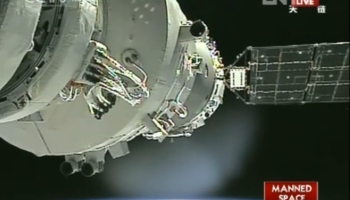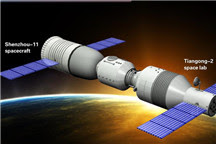The Chinese want advancement just as much as others do. It’s just that they would rather do it quietly.
 Patriotic spirit: A paramilitary soldier guarding a giant flower bouquet
at Tiananmen Square in Beijing to commemorate Chinese National Day. —
AFP
Patriotic spirit: A paramilitary soldier guarding a giant flower bouquet
at Tiananmen Square in Beijing to commemorate Chinese National Day. —
AFPThese are good reasons. But what are the real ones? Why can't other nations do the same? The United States used to be a major manufacturing country. Now it’s a consumption economy with an astounding number of obese people. Why?
What drives the way the Chinese do things and conduct themselves at the personal as well as national level? I have seen Chinese graduate students in the United States who kept quiet in the classroom when the professor asked a question but at the end of the semester, managed to score all As. They have no intention of showing off. They are advancing slowly but surely without making a lot of noise.
Despite all its strength and ambition, China is not bent on global domination. Although its influence is undeniably rising, its engagement is transactional, not imperial. Its interest beyond Asia is mainly in countries that can provide it with raw materials and markets.
Talk of China’s big footprints in Africa, for example, is overstated. Its stock of direct investment in the continent still lags far behind that of Great Britain and France, and amounts to only a third of the United States’. In Africa and Latin America, it is concentrating more on taking stakes in local companies, not just buying up land and resources.
China likes to mind its own business. It wants to have as little involvement abroad as it can get away with. Instead of acting for the greater good of humanity, it responds pragmatically when its own interests are at stake. Its navy has begun to participate in anti-piracy operations off the Horn of Africa and in United Nations peacekeeping in Africa. In 2011, it sent a ship to co-ordinate the evacuation of 36,000 Chinese workers from Libya.
The world may anticipate more such actions as its companies get more deeply involved around the globe. It is also making inroads into the use of soft power through Confucius Institutes all over the world that try to demonstrate that China and its culture are benign.
What China is against is easier to comprehend than what it is for. It opposed Bush’s incursion into Iraq in 2003, vetoed the interventions Western powers sought in Syria and Darfur and took no position on the Russian annexation of Crimea. Chinese leaders are not great fans of the existing system of alliances but offer no alternative system of collective security. They talk about sharing resources in the South and East China Seas, but have offered no definite proposals to this end.
Disappointed by what it sees as its lack of influence in international organisations, China led the establishment of the Shanghaibased New Development Bank in 2014, of which all the Brics countries are members and which looks like a tenderfoot to the World Bank. It has also set up an Asian Infrastructure Investment Bank to rival the ADB.
A late appearance is not unusual for a great power. It took a world war to draw the United States irreversibly onto the world stage. Over 200 years, through much pain and suffering, China has transformed the very centre of its identity, changing itself from an inwardand backward-looking society to an outward- and forward-looking power. Since 1978, it has shown both flexibility and firm resolve in its continued pursuit of wealth and power.
Many countries around the world respect, and would like to imitate, the undemocratic but efficient way that China has managed its decades of growth. But how exactly to go about it? What do they know that the rest of the world doesn’t? Well, for one thing, they don’t believe that they are superior to others or destined by the Divine to be great. They know they have to work for it.
They are honest with themselves. More importantly, they know how. While the Western culture teaches people to be “themselves”, there could be no advice more hollow than this.
Confucius, Mencius, Zhuangzi and other Chinese thinkers, more than 2,000 years ago taught that we shouldn’t be looking for our essential self, let alone seeking to embrace it, because there is no true, absolute self to begin with.
As they understood, human beings are messy, multi-dimensional beings, a tangle of conflicting emotions and capabilities in a messy, ever-changing world. We are who we are by reacting to one another. It’s no wonder that the Chinese leadership is turning to ancient philosophy for support. That’s something to learn from China.
Related posts:
China, the shy superpower
Graphics shows the launching process of Shenzhou-11 manned spacecraft.(Xinhua/Lu Zhe) https://youtu.be/7Jhx4J2j_kw China laun...

Chinese astronauts enter their space station following docking
Rendez-vous By Wang Xiaoying https://youtu.be/35B4d_3qCd0 Shenzhou-11 docks with Tiangong-2 space lab ...

China space economy developing rapidly, the most accurate atomic clock in the world Snail-like progress By Cai Meng New company set up to develop space economy The commercialization of rocket launches will boost .

Philippine President Duterte in China for "Historic" Visit ; US Media Churlish!
Philippine President Rodrigo Duterte
arrives in Beijing on October 18, 2016, beginning his state visit to
China. [Photo: Chinanews.co...

World doubts the leadership of Uncle Sam: expert

World doubts the leadership of Uncle Sam: expert
The culture of guns As the US has
lost more international status and influence since the global financial
crisis in 2008, the inter...














